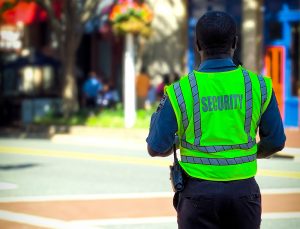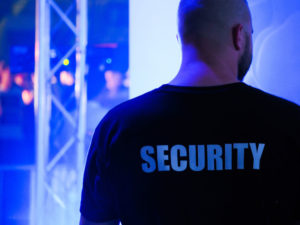By Bill Herzog
Unruly customers and violence can ruin a bar’s reputation. When a bar gets mentioned in the news due to fights or constantly having police called to the location for physical altercations, its demise is usually right around the corner.
A bar with an atmosphere of fear surrounding it makes it difficult to keep the business running smoothly. Guests will stay away from the establishment, which in turn makes it hard to keep revenue coming in. While it is impossible to prevent all altercations from happening, it is possible to minimize these situations with well-trained security measures. Having worked in law enforcement for over 25 years and in the security industry at LionHeart Security Services, here are some proven ways to keep your bar safe.
Security begins at the door
Well-trained lead doormen are critical for maintaining a safe environment for patrons. Doormen must be capable of identifying and turning away potential troublemakers before they get inside and cause problems. Strong doormen know how to diffuse potential problems and refuse entry to unruly guests in a way that keeps the situation calm. When intoxicated people view any type of situation involving rejection as a hostile issue, having a doorman who can think and react quickly is important.
Despite the challenges presented by preventing entry to certain guests, security-focused staff know that doing so can prevent dangerous situations from occurring. A good security person at the front door is much more than a host or a person to check identification. Experienced security personnel will recognize faces who have caused issues in the past and have the capability of using this knowledge to control the quality of patrons inside the bar. Having a strong lead doorman will result in a safer environment for your staff and guests.
Engaging and neutralizing threats
An experienced security guard will not wait for trouble to start before they intervene. If all your security does is remove overly drunk people or break up fights, it is clear they are not engaging threats before they turn into worse situations. For example, if security sees an intoxicated individual stumbling around, they must have the foresight to engage the person, find who he came to the bar with, and help get them a safe ride home.
Security must constantly be scanning their surroundings and communicating with guests, staff, and other security members to identify potential threats. Some situations, like a person slipping something into someone’s drink, may go unnoticed by an untrained eye, but a security guard who is aware of their surroundings will spot these situations, intervene, and take proper action. Neutralizing dangerous situations before they get out of hand is key when it comes to great security for your establishment.
Working with law enforcement
Even with trained security, there are times when your team will need an assist from local law enforcement. Experienced security staff know local police and work to create good relationships with them. Sometimes, all it takes is a text message to an officer for a quick response to your establishment. Building relationships with local law enforcement needs to be a priority for security team leaders. Having a well-established relationship allows your team to have the backup they need to handle difficult patrons and situations.
Taking the first steps with these bar security tips allows you to build a security staff that will keep your business safe and running smoothly. Deterring external threats and preventing your establishment from building a bad reputation is critical, particularly when it comes to the safety of staff and guests. Following these principles of deterrence and response are the best way to begin making your bar ready for any situation.
Bill Herzog is the CEO of LionHeart Security Services in Tempe, Arizona. Herzog is experienced in security for bars, restaurants, and commercial properties and has over 25 years of law enforcement experience.









